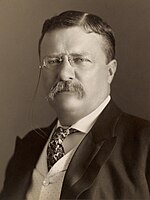| ||||||||||||||||||||||||||
| ||||||||||||||||||||||||||
 County Results
| ||||||||||||||||||||||||||
| ||||||||||||||||||||||||||
| Elections in Tennessee |
|---|
 |
|
|
The 1904 United States presidential election in Tennessee took place on November 8, 1904. All contemporary 45 states were part of the 1904 United States presidential election. Voters chose 12 electors to the Electoral College, which selected the president and vice president.
For over a century after the Civil War, Tennessee was divided according to political loyalties established in that war. Unionist regions covering almost all of East Tennessee, Kentucky Pennyroyal-allied Macon County, and the five West Tennessee Highland Rim counties of Carroll, Henderson, McNairy, Hardin and Wayne[1] voted Republican – generally by landslide margins – as they saw the Democratic Party as the “war party” who had forced them into a war they did not wish to fight.[2] Contrariwise, the rest of Middle and West Tennessee who had supported and driven the state’s secession was equally fiercely Democratic as it associated the Republicans with Reconstruction.[3] After the disfranchisement of the state’s African-American population by a poll tax was largely complete in the 1890s,[4] the Democratic Party was certain of winning statewide elections if united,[5] although unlike the Deep South Republicans would almost always gain thirty to forty percent of the statewide vote from mountain and Highland Rim support.
Tennessee would be won by the Democratic nominees, Chief Judge Alton B. Parker of New York and his running mate Henry G. Davis of West Virginia. They defeated the Republican nominees, incumbent President Theodore Roosevelt of New York and his running mate Senator Charles W. Fairbanks of Indiana. Parker won the state by a margin of 10.83%.
Although the GOP had lost by only single figures in the previous two elections, the shift to the more conservative Democrat Parker who opposed Roosevelt’s hosting of Booker T. Washington[6] meant that the state swung slightly – though significantly given the extremely deep partisan loyalties – against the GOP to the Democrats.
- ^ Wright, John K.; ‘Voting Habits in the United States: A Note on Two Maps’; Geographical Review, vol. 22, no. 4 (October 1932), pp. 666-672
- ^ Key (Jr.), Valdimer Orlando; Southern Politics in State and Nation (New York, 1949), pp. 282-283
- ^ Lyons, William; Scheb (II), John M. and Stair Billy; Government and Politics in Tennessee, pp. 183-184 ISBN 1572331410
- ^ Phillips, Kevin P.; The Emerging Republican Majority, pp. 208, 210 ISBN 9780691163246
- ^ Grantham, Dewey W.; ‘Tennessee and Twentieth-Century American Politics’; Tennessee Historical Quarterly, Vol. 54, No. 3 (Fall 1995), pp. 210-229
- ^ Tindall, George B.; ‘Southern Strategy: A Historical Perspective’; North Carolina Historical Review; vol. 48, no. 2 (April 1971), pp. 126-141
© MMXXIII Rich X Search. We shall prevail. All rights reserved. Rich X Search


